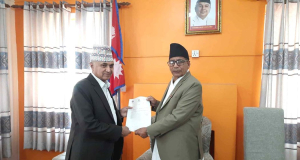Student wings of the opposition alliance as well as CPN-UML have resorted to staging protests almost daily under various pretexts as soon the government eased COVID-induced prohibitory orders a couple of weeks ago.
The opposition alliance is comprised of Nepali Congress, CPN-Maoist Center, Madhav Kumar Nepal-led faction of CPN-UML, Rastriya Janamorcha Party and the Baburam Bhattarai-Upendra Yadav faction of Janata Samajwadi Party.
The alliance was formed to fight (politically and legally) against President Bidya Devi Bhandari’s decision to dissolve the House of Representatives at the recommendation of Prime Minister KP Sharma Oli for a second time in less than six months, and to hold snap elections in November.
Dozens of student cadres from the alliance have been gathering in the streets of Kathmandu as well as various other districts, burning effigies and posters of Oli and the President, taking out rallies, and chanting slogans against the government as part of their protests.
The Supreme Court’s Constitutional Bench has yet to announce its verdict on the cases filed against House dissolution as the hearing concluded on Monday.
However, on Monday, the Election Commission announced the schedule for midterm polls slated for November 12 and 19.
As per the schedule, political parties can start registering to take part in the general elections from July 15 till July 30. Preparations in the run up to the election and the days of the scheduled polls will undoubtedly invite large crowds.
The government has currently prohibited people from organizing any kind of gatherings, rallies or procession (political as well as religious) as per the prohibitory orders issued to curb the spread of COVID-19.
The prohibitory orders have been in place since April 29, but the government gradually eased the restrictions citing declining number of new infections.
According to former director of the Division of Epidemiology and Disease Control Dr GD Thakur, the spread of COVID-19 is estimated to have increased after the prohibitory orders were eased.
“Conducting merely 6,000-7,000 tests every day among a population of nearly 30 million will not give us the real glimpse of COVID situation in Nepal. Now that the prohibitory orders have been eased, the government should have expanded tests among the general population,” he said.
The Ministry of Health and Population conducted 7,499 RT-PCR tests and 4,028 Antigen tests on Monday.
While Nepali politicians are locked in a power struggle, the coronavirus continues to spread — with levels of testing and vaccination both woefully inadequate.
“As the country is at high risk of a third wave, availability of vaccines should be ensured immediately,” said Dr Thakur.
At a time when vaccine procurement is sluggish, the Detla and delta Plus mutated strains of the virus are likely to invite a third wave of the virus, as per Infectious diseases expert Dr Prabhat Adhikari.
“As these new variants are highly transmissible, the COVID positive rate in the country has not declined significantly in the first week of July from 20 percent in June,” he said. The positive rate stood at 45 per cent in May.
Last week, between 30 and 40 people died each day due to COVID-related complications. Health experts have been warning that progress so far achieved in bringing down the infection rate may be lost if people fail to adhere to health safety protocols like social distancing and wearing masks.
On Monday, as many as 1,745 cases of coronavirus infection were reported across the country, including 562 in the Kathmandu valley, while the number stood at 1,042 new cases including 461 in Kathmandu on Sunday.
Dr Anup Subedi, an infectious disease physician, warned that Nepal was still vulnerable to new strains. “If new variants come, herd immunity doesn’t matter as everyone becomes vulnerable again. The spread can explode again and we don’t have the measures in place to respond,” he said.
Though the second wave of the coronavirus pandemic has exposed entrenched socio-economic problems as well as the frail healthcare system in Nepal, poor governance has added to the nation’s woes.
Partisan protestors are backed and mobilized by political parties to fulfill the latters’ vested interests. Protests and demonstrations not only disregard public health protocol amid a global pandemic but also put people’s lives at risk.


